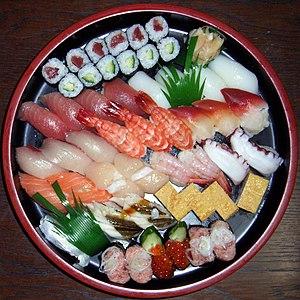 Sushi platter | |
| Place of origin | Japan |
|---|---|
| Region or state | East Asia |
| Main ingredients |
|
Sushi (すし, 寿司, 鮨, 鮓, pronounced [sɯɕiꜜ] or [sɯꜜɕi] ) is a Japanese dish of prepared vinegared rice (鮨飯, sushi-meshi), usually with some sugar and salt, plus a variety of ingredients (ねた, neta), such as vegetables, meat, or most commonly, seafood, which may be raw or cooked. There are many styles of sushi, and its presentation varies widely, but the one key ingredient is "sushi rice", also referred to as shari (しゃり), or sumeshi (酢飯).[1]
The modern form of sushi is believed to have been created by Hanaya Yohei, who invented nigiri-zushi, the most commonly recognized type today, in which seafood is placed on hand-pressed vinegared rice. This innovation occurred around 1824 in the Edo period (1603–1867). It was the fast food of the chōnin class in the Edo period.[2][3][4]
Sushi is traditionally made with medium-grain white rice, although it can also be prepared with brown rice or short-grain rice. It is commonly prepared with seafood, such as squid, eel, yellowtail, salmon, tuna or imitation crab meat. Certain types of sushi are vegetarian. It is often served with pickled ginger (gari), wasabi, and soy sauce. Daikon radish or pickled daikon (takuan) are popular garnishes for the dish.
Sushi is sometimes confused with sashimi, a dish that consists of thinly sliced raw fish or occasionally meat, without sushi rice.[5]
- ^ "Sushi – How-To". FineCooking. May 1, 1998. Archived from the original on November 4, 2019. Retrieved November 4, 2019.
- ^ "The Mysteries of Sushi – Part 2: Fast Food". Toyo Keizai. May 23, 2015. Archived from the original on September 9, 2017.
- ^ "When Sushi Became a New Fast Food in Edo". Nippon.com. December 22, 2020. Archived from the original on January 18, 2021.
- ^ "Sushi". Nihonbashi. Archived from the original on December 28, 2021.
- ^ "Sashimi vs Sushi – Difference and Comparison | Diffen". www.diffen.com. Archived from the original on June 5, 2019. Retrieved June 5, 2019.